新概念英语第一册 Lesson 71-72课件(共25张PPT)
文档属性
| 名称 | 新概念英语第一册 Lesson 71-72课件(共25张PPT) | 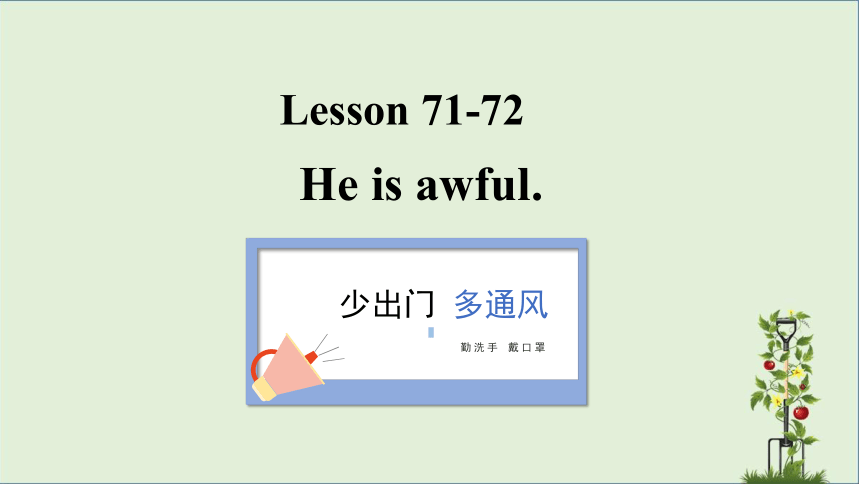 | |
| 格式 | pptx | ||
| 文件大小 | 5.6MB | ||
| 资源类型 | 教案 | ||
| 版本资源 | 新概念英语 | ||
| 科目 | 英语 | ||
| 更新时间 | 2024-07-30 09:34:08 | ||
图片预览

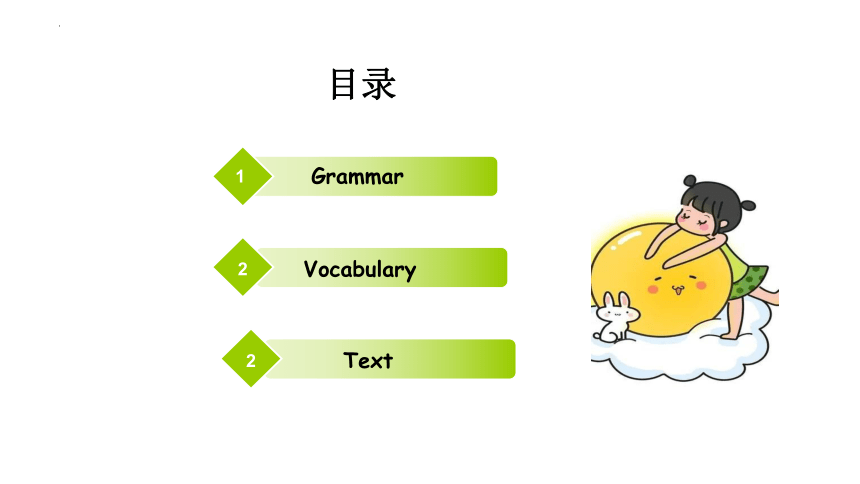
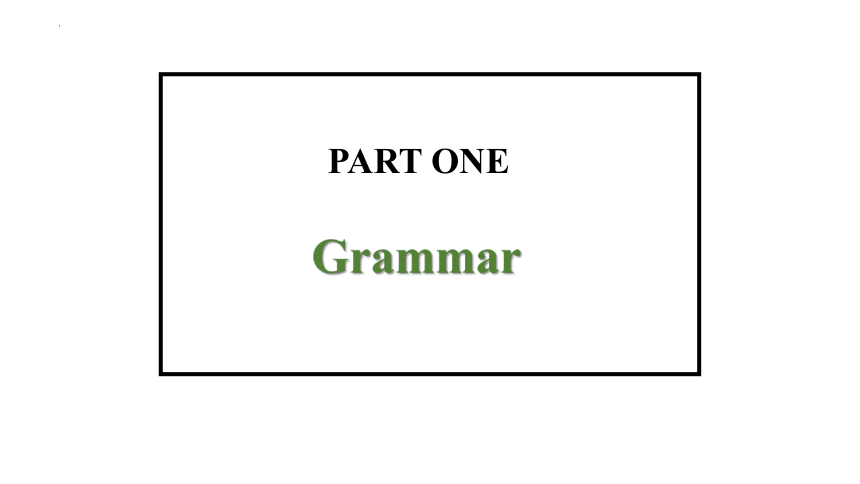
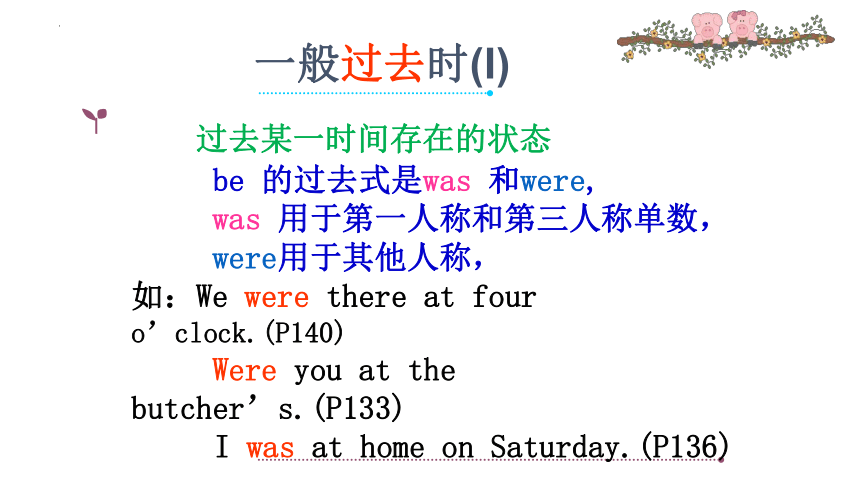
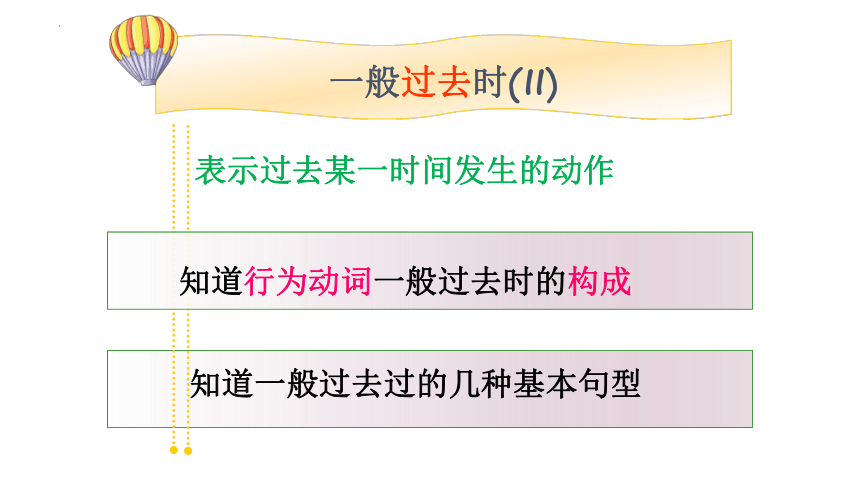
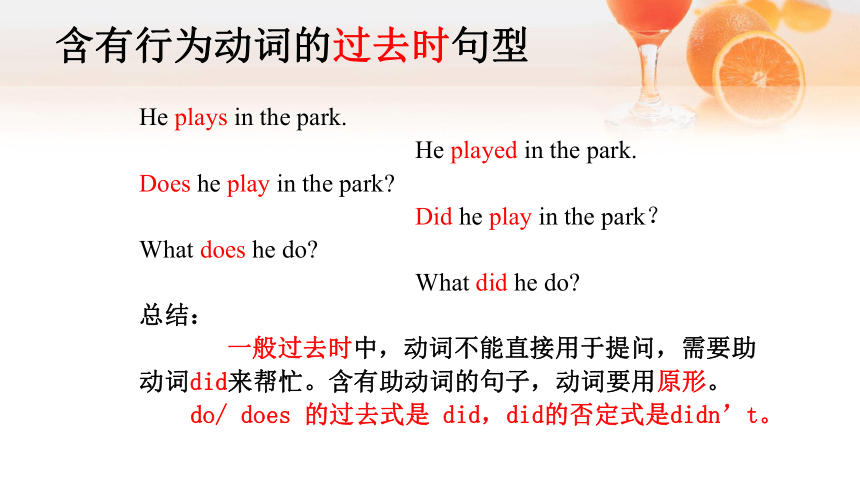
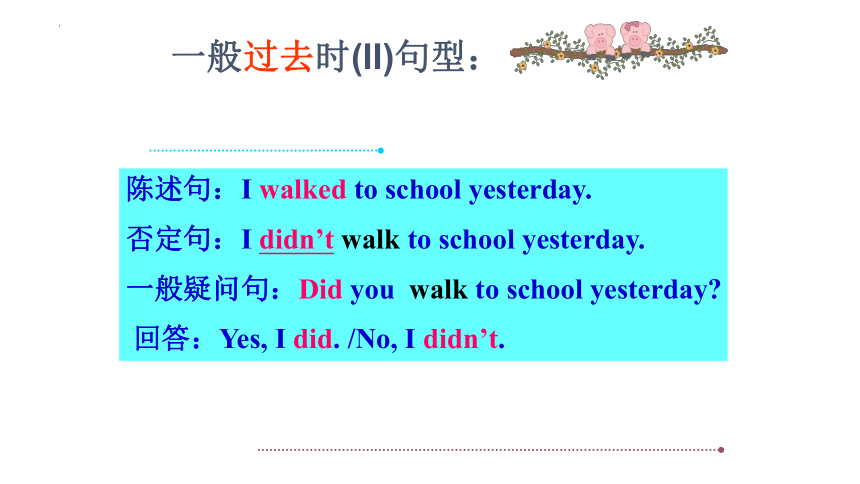
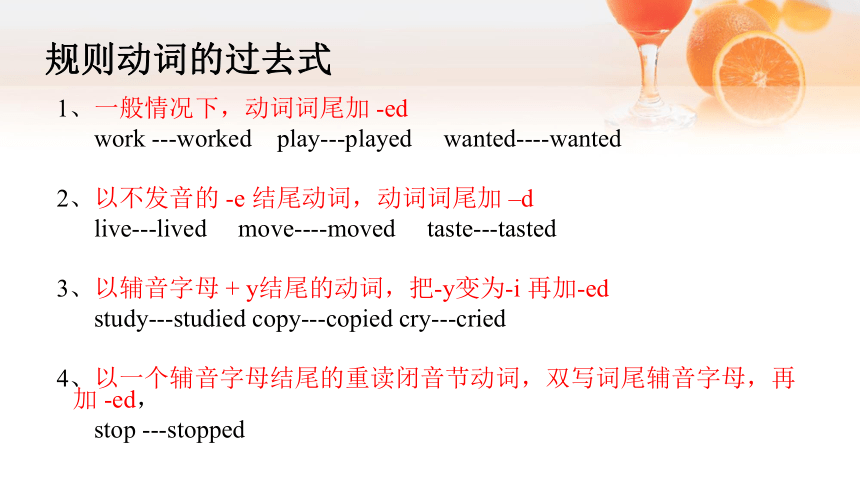
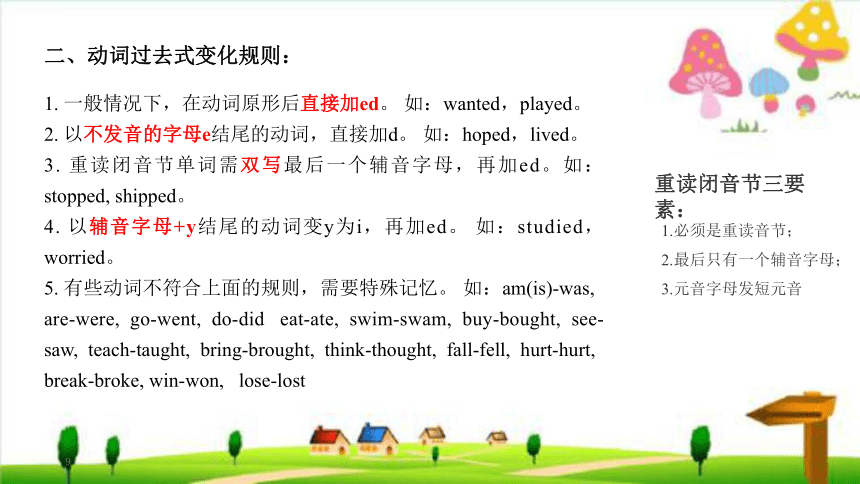
文档简介
(共25张PPT)
少出门 多通风
勤洗手 戴口罩
Lesson 71-72
He is awful.
目录
Grammar
1
Vocabulary
2
Text
2
PART ONE
Grammar
一般过去时(I)
过去某一时间存在的状态
be 的过去式是was 和were,
was 用于第一人称和第三人称单数,
were用于其他人称,
如:We were there at four o’clock.(P140)
Were you at the butcher’s.(P133)
I was at home on Saturday.(P136)
表示过去某一时间发生的动作
一般过去时(II)
知道一般过去过的几种基本句型
知道行为动词一般过去时的构成
含有行为动词的过去时句型
He plays in the park.
He played in the park.
Does he play in the park
Did he play in the park?
What does he do
What did he do
总结:
一般过去时中,动词不能直接用于提问,需要助
动词did来帮忙。含有助动词的句子,动词要用原形。
do/ does 的过去式是 did,did的否定式是didn’t。
陈述句:I walked to school yesterday.
否定句:I didn’t walk to school yesterday.
一般疑问句:Did you walk to school yesterday
回答:Yes, I did. /No, I didn’t.
一般过去时(II)句型:
规则动词的过去式
1、一般情况下,动词词尾加 -ed
work ---worked play---played wanted----wanted
2、以不发音的 -e 结尾动词,动词词尾加 –d
live---lived move----moved taste---tasted
3、以辅音字母 + y结尾的动词,把-y变为-i 再加-ed
study---studied copy---copied cry---cried
4、以一个辅音字母结尾的重读闭音节动词,双写词尾辅音字母,再加 -ed,
stop ---stopped
1.一般情况下,在动词原形后直接加ed。 如:wanted,played。2.以不发音的字母e结尾的动词,直接加d。 如:hoped,lived。3.重读闭音节单词需双写最后一个辅音字母,再加ed。如:stopped, shipped。4.以辅音字母+y结尾的动词变y为i,再加ed。 如:studied,worried。5.有些动词不符合上面的规则,需要特殊记忆。 如:am(is)-was, are-were, go-went, do-did eat-ate, swim-swam, buy-bought, see-saw, teach-taught, bring-brought, think-thought, fall-fell, hurt-hurt, break-broke, win-won, lose-lost二、动词过去式变化规则:重读闭音节三要素:1.必须是重读音节;2.最后只有一个辅音字母;3.元音字母发短元音1. 一般的动词后面直接加-ed
① 清辅音后面加ed,读[t] asked
② 浊辅音或元音后面加ed,读[d] cleaned
③ d/t +ed [ d] dusted
2. 单词末尾是e的直接加d believed
3. 辅音字母加y结尾的单词,要把y变i加ed, studied
三、发音规则:
常用时间状语:引导的含过去时的句子
Yesterday
Today
The day before yesterday
This morning
This afternoon
This evening
tonight
一般过去时
一般现在时
一般过去时
yesterday morning
yesterday afternoon
yesterday evening
last night
the day before yesterday in the morning
the day before yesterday in the afternoon
the day before yesterday in the evening
the night before last
1. All the books _____ (be) not here, but they _____ (be) here a moment ago.
2. It ______ (be) there just now, but it isn’t there now.
3. Your CD (be) on the ground just now.
4. Where’s the camera It ________ (is) there a moment ago.
5. It _______ (be) Helen’s birthday yesterday.
6. Tom _______(go ) to visit a farm last week.
7. The twins _______ (water) the flowers in the garden yesterday morning.
8. I _______ (watch) a film with my friend last Friday.
9. What_______ (do) you do three days ago
10. _______ (be) there any parks in the town in 1950
用所给词的适当形式填空
将下列句子变为一般疑问句,并对划线部分提问
He telephoned me four times yesterday.
Did he telephone you four times yesterday
When did he telephone you four times
He telephoned at nine o’clock.
Did he telephone at nine o’clock
What did he do at nine o’clock
I arrived home at six yesterday evening.
Did you arrive home at six yesterday evening
What did you do at six yesterday evening
PART TWO
Vocabulary
awful adj. 让人讨厌的,坏的
telephone v. & n. 打电话;电话
time n. 次(数)
answer v. 接(电话)
last adj. 最后的,前一次的
phone n. 电话(=telephone)
again adv. 又一次地
say (said) v. 说
awful adj. 让人讨厌的,坏的
awfully adv. 非常
(在表示负面的情景中,可用awfully代替very)
I am awfully ( very ) sorry.
time n. 次(数)
time在英语中作不可数名词时表示“时间”;作可数名词时表示“次数”,三次或三次以上通常用基数词+times表示:
once,twice,three times
on time 按时,准时
in time 及时
all the time 一直
once upon a time 很久很久以前
★answer v. 接(电话)
① v. 对……作出反应;响应
answer the phone/telephone 接电话
answer the door/doorbell 应声开门
② v. 回答;答复
answer a letter 回信
I don’t think you’ve answered my question.
我认为你没有回答我的问题。
③ n. 答案;解决办法;答复
I wrote him several letters but couldn’t get an answer.
我给他写了好几封信,可都没有回音。
Do you know the answer to Question 10
last adj. 前一次的, 最后的
last + 时间, 表示过去
上个星期
上个月
去年
say v. 说
过去式 said
say to sb. 对某人说…
PART THREE
Text
Watch and answer
How did Pauline answer the telephone at nine o’clock?
She said, ‘This is Pauline’s mother. Please don’t telephone my daughter again.
JANE: What's Ron Marston like, Pauline
PAULINE: He's awful!
He telephoned me four times yesterday,
and three times the day before yesterday.
PAULINE: He telephoned the office yesterday morning and yesterday afternoon. My boss answered the telephone.
JANE: What did your boss say to him
PAULINE: He said, "Pauline is typing letters. She can't speak to you now!"
PAULINE: Then I arrived home at six o'clock yesterday evening.
He telephoned again. But I didn't answer the phone!
JANE: Did he telephone again last night
PAULINE: Yes, he did.
He telephoned at nine o'clock.
JANE: What did you say to him
PAULINE: I said, 'This is Pauline's mother.
Please don't telephone my daughter again!'
JANE: Did he telephone again
PAULINE: No, he didn't!
精讲课文
1. What's Ron Marston like, Pauline
波琳,朗·马斯顿是怎样一个人?
What is sb. like 用来询问某人的外貌或品行。
What is the weather like 天气如何?
2. He telephoned me four times yesterday…
他昨天给我打了4次电话……
four times, 4次。 time在英语中作不可数名词时表示“时间”;作可数名词时表示“次数”。
请注意英语中次数的表示法:
once 1次 twice 2次 three times 3次
3. the day before yesterday, 前天
4. answer the telephone, 接电话
口语中也常用 answer the phone。类似的短语如:
answer the door/doorbell 应声开门
answer a letter回信
5. She can't speak to you now! 她现在不能同你讲话!
speak to sb. 意为“与某人说话”。
例如打电话时可以说:
May I speak to Pauline, please 请让波琳接电话好吗?
6. This is Pauline's mother.
我是波琳的母亲。
This is…是英美人打电话时表示“我是……”的句式,而不说 I'm…。相关的电话用语如:
This is Mary speaking.
我是玛丽。
This is Edward calling from London.
我是爱德华,现正在伦敦给你打电话。
少出门 多通风
勤洗手 戴口罩
Lesson 71-72
He is awful.
目录
Grammar
1
Vocabulary
2
Text
2
PART ONE
Grammar
一般过去时(I)
过去某一时间存在的状态
be 的过去式是was 和were,
was 用于第一人称和第三人称单数,
were用于其他人称,
如:We were there at four o’clock.(P140)
Were you at the butcher’s.(P133)
I was at home on Saturday.(P136)
表示过去某一时间发生的动作
一般过去时(II)
知道一般过去过的几种基本句型
知道行为动词一般过去时的构成
含有行为动词的过去时句型
He plays in the park.
He played in the park.
Does he play in the park
Did he play in the park?
What does he do
What did he do
总结:
一般过去时中,动词不能直接用于提问,需要助
动词did来帮忙。含有助动词的句子,动词要用原形。
do/ does 的过去式是 did,did的否定式是didn’t。
陈述句:I walked to school yesterday.
否定句:I didn’t walk to school yesterday.
一般疑问句:Did you walk to school yesterday
回答:Yes, I did. /No, I didn’t.
一般过去时(II)句型:
规则动词的过去式
1、一般情况下,动词词尾加 -ed
work ---worked play---played wanted----wanted
2、以不发音的 -e 结尾动词,动词词尾加 –d
live---lived move----moved taste---tasted
3、以辅音字母 + y结尾的动词,把-y变为-i 再加-ed
study---studied copy---copied cry---cried
4、以一个辅音字母结尾的重读闭音节动词,双写词尾辅音字母,再加 -ed,
stop ---stopped
1.一般情况下,在动词原形后直接加ed。 如:wanted,played。2.以不发音的字母e结尾的动词,直接加d。 如:hoped,lived。3.重读闭音节单词需双写最后一个辅音字母,再加ed。如:stopped, shipped。4.以辅音字母+y结尾的动词变y为i,再加ed。 如:studied,worried。5.有些动词不符合上面的规则,需要特殊记忆。 如:am(is)-was, are-were, go-went, do-did eat-ate, swim-swam, buy-bought, see-saw, teach-taught, bring-brought, think-thought, fall-fell, hurt-hurt, break-broke, win-won, lose-lost二、动词过去式变化规则:重读闭音节三要素:1.必须是重读音节;2.最后只有一个辅音字母;3.元音字母发短元音1. 一般的动词后面直接加-ed
① 清辅音后面加ed,读[t] asked
② 浊辅音或元音后面加ed,读[d] cleaned
③ d/t +ed [ d] dusted
2. 单词末尾是e的直接加d believed
3. 辅音字母加y结尾的单词,要把y变i加ed, studied
三、发音规则:
常用时间状语:引导的含过去时的句子
Yesterday
Today
The day before yesterday
This morning
This afternoon
This evening
tonight
一般过去时
一般现在时
一般过去时
yesterday morning
yesterday afternoon
yesterday evening
last night
the day before yesterday in the morning
the day before yesterday in the afternoon
the day before yesterday in the evening
the night before last
1. All the books _____ (be) not here, but they _____ (be) here a moment ago.
2. It ______ (be) there just now, but it isn’t there now.
3. Your CD (be) on the ground just now.
4. Where’s the camera It ________ (is) there a moment ago.
5. It _______ (be) Helen’s birthday yesterday.
6. Tom _______(go ) to visit a farm last week.
7. The twins _______ (water) the flowers in the garden yesterday morning.
8. I _______ (watch) a film with my friend last Friday.
9. What_______ (do) you do three days ago
10. _______ (be) there any parks in the town in 1950
用所给词的适当形式填空
将下列句子变为一般疑问句,并对划线部分提问
He telephoned me four times yesterday.
Did he telephone you four times yesterday
When did he telephone you four times
He telephoned at nine o’clock.
Did he telephone at nine o’clock
What did he do at nine o’clock
I arrived home at six yesterday evening.
Did you arrive home at six yesterday evening
What did you do at six yesterday evening
PART TWO
Vocabulary
awful adj. 让人讨厌的,坏的
telephone v. & n. 打电话;电话
time n. 次(数)
answer v. 接(电话)
last adj. 最后的,前一次的
phone n. 电话(=telephone)
again adv. 又一次地
say (said) v. 说
awful adj. 让人讨厌的,坏的
awfully adv. 非常
(在表示负面的情景中,可用awfully代替very)
I am awfully ( very ) sorry.
time n. 次(数)
time在英语中作不可数名词时表示“时间”;作可数名词时表示“次数”,三次或三次以上通常用基数词+times表示:
once,twice,three times
on time 按时,准时
in time 及时
all the time 一直
once upon a time 很久很久以前
★answer v. 接(电话)
① v. 对……作出反应;响应
answer the phone/telephone 接电话
answer the door/doorbell 应声开门
② v. 回答;答复
answer a letter 回信
I don’t think you’ve answered my question.
我认为你没有回答我的问题。
③ n. 答案;解决办法;答复
I wrote him several letters but couldn’t get an answer.
我给他写了好几封信,可都没有回音。
Do you know the answer to Question 10
last adj. 前一次的, 最后的
last + 时间, 表示过去
上个星期
上个月
去年
say v. 说
过去式 said
say to sb. 对某人说…
PART THREE
Text
Watch and answer
How did Pauline answer the telephone at nine o’clock?
She said, ‘This is Pauline’s mother. Please don’t telephone my daughter again.
JANE: What's Ron Marston like, Pauline
PAULINE: He's awful!
He telephoned me four times yesterday,
and three times the day before yesterday.
PAULINE: He telephoned the office yesterday morning and yesterday afternoon. My boss answered the telephone.
JANE: What did your boss say to him
PAULINE: He said, "Pauline is typing letters. She can't speak to you now!"
PAULINE: Then I arrived home at six o'clock yesterday evening.
He telephoned again. But I didn't answer the phone!
JANE: Did he telephone again last night
PAULINE: Yes, he did.
He telephoned at nine o'clock.
JANE: What did you say to him
PAULINE: I said, 'This is Pauline's mother.
Please don't telephone my daughter again!'
JANE: Did he telephone again
PAULINE: No, he didn't!
精讲课文
1. What's Ron Marston like, Pauline
波琳,朗·马斯顿是怎样一个人?
What is sb. like 用来询问某人的外貌或品行。
What is the weather like 天气如何?
2. He telephoned me four times yesterday…
他昨天给我打了4次电话……
four times, 4次。 time在英语中作不可数名词时表示“时间”;作可数名词时表示“次数”。
请注意英语中次数的表示法:
once 1次 twice 2次 three times 3次
3. the day before yesterday, 前天
4. answer the telephone, 接电话
口语中也常用 answer the phone。类似的短语如:
answer the door/doorbell 应声开门
answer a letter回信
5. She can't speak to you now! 她现在不能同你讲话!
speak to sb. 意为“与某人说话”。
例如打电话时可以说:
May I speak to Pauline, please 请让波琳接电话好吗?
6. This is Pauline's mother.
我是波琳的母亲。
This is…是英美人打电话时表示“我是……”的句式,而不说 I'm…。相关的电话用语如:
This is Mary speaking.
我是玛丽。
This is Edward calling from London.
我是爱德华,现正在伦敦给你打电话。
同课章节目录
